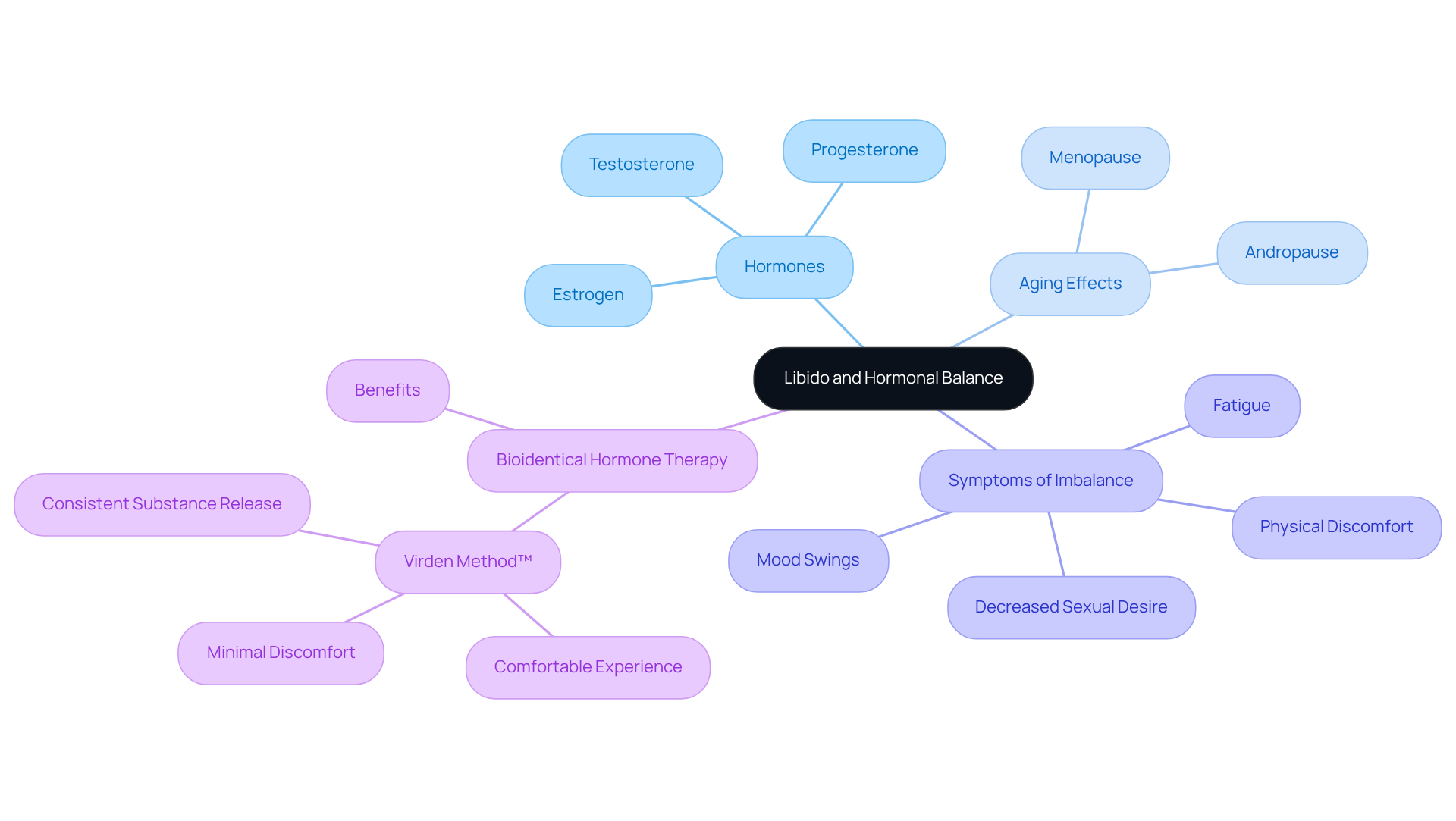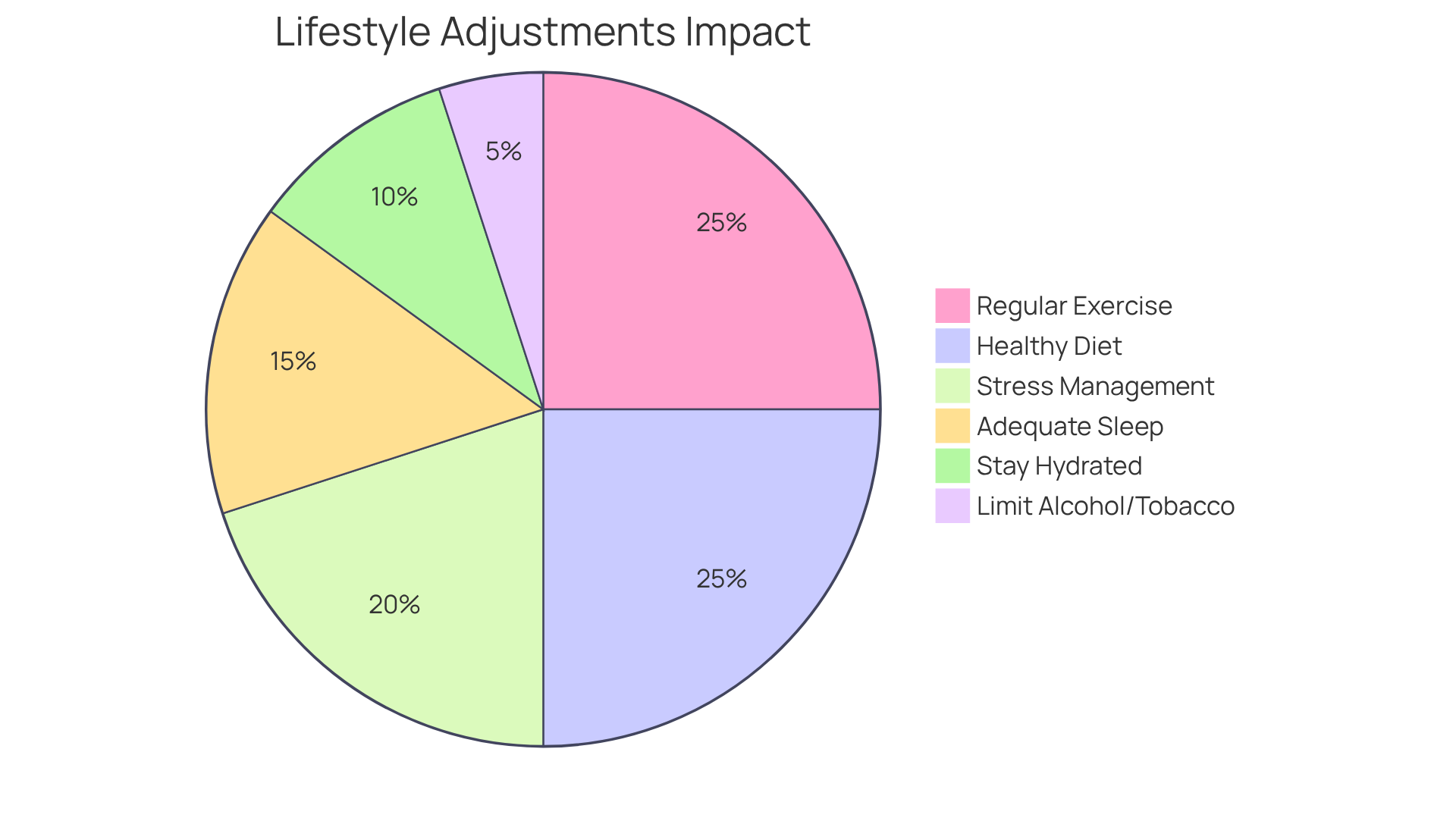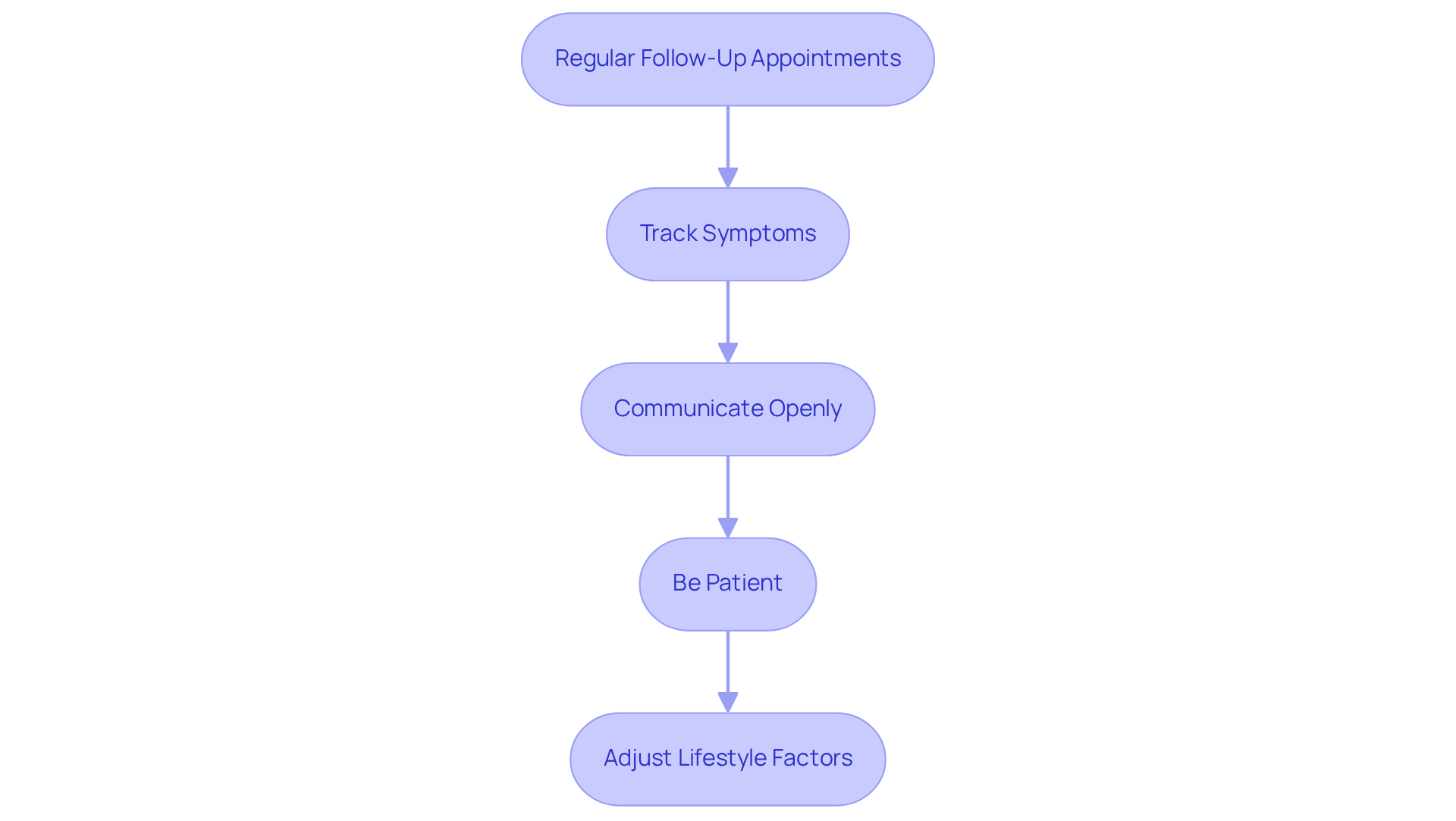


Understanding the relationship between hormones and libido can feel overwhelming, especially as we age. Many individuals experience fluctuations in hormone levels that can lead to a decrease in sexual desire. This is where bioidentical hormone therapy comes into play, offering a hopeful path for those looking to restore their vitality and intimacy.
But as you consider this journey, you might wonder: How can you make informed choices about your hormone health? What steps can you take to achieve the best results? These questions are important, and exploring them can empower you to reclaim your sexual well-being and enhance your overall quality of life.
In addition to this, it’s essential to remember that you’re not alone in this experience. Many people share similar concerns, and there are solutions available that can help. By taking the time to understand your options and seeking support, you can navigate this complex landscape with confidence.
Ultimately, the goal is to foster a sense of intimacy and connection in your life. With the right guidance and care, you can take meaningful steps toward a healthier, more fulfilling future.
Libido, or sexual desire, can be deeply affected by a complex mix of hormones, and bioidentical hormone therapy libido can play a significant role in this hormonal balance, including estrogen, testosterone, and progesterone. As we age, fluctuations in hormone levels can often lead to a decrease in sexual desire, which is where bioidentical hormone therapy libido can be beneficial. For example, many women experience a drop in estrogen during menopause, which can result in reduced sexual interest and discomfort. Similarly, men may notice a natural decline in testosterone levels, particularly during andropause, impacting their sexual drive and overall vitality.
Recognizing the signs of hormonal imbalances—such as decreased sexual desire, fatigue, mood swings, and even physical discomfort—is essential for those looking to improve their situation with bioidentical hormone therapy libido. Research shows that up to 40% of women over 60 report low libido, yet many still consider bioidentical hormone therapy libido an essential aspect of their lives. This underscores the importance of open conversations about sexual health, as many may feel hesitant to discuss these issues with their healthcare providers.
At Amavita Heart and Vascular Health, we offer the innovative Virden Method™ for testosterone therapy, designed to provide a more comfortable experience with minimal discomfort during the procedure. This method allows for precise pellet placement through a single entry point, ensuring consistent substance release and longer-lasting benefits. The procedure takes just 15 minutes, and 98% of our patients express excellent satisfaction with this advanced placement technique.
Consulting with a healthcare provider is crucial for assessing hormone levels through blood tests, ideally conducted in the morning when testosterone levels are at their peak. Endocrinologists remind us that a decrease in libido doesn’t always mean low testosterone levels; a thorough health evaluation is key to uncovering the root causes of changes in libido, which may involve bioidentical hormone therapy libido. By understanding these biological dynamics, individuals can take meaningful steps toward restoring their sexual health and overall well-being.

Bioidentical therapy (BHRT) offers a compassionate approach to managing hormonal imbalances, using substances that are chemically identical to those naturally produced by your body. This personalized therapy stands apart from synthetic compounds, which can have different chemical structures and may lead to unwanted side effects. Instead, bioidentical substances are derived from plant sources and closely mimic your body’s own hormones. For older adults facing challenges like reduced sexual desire, fatigue, and mood swings, bioidentical hormone therapy libido aims to restore hormonal levels to a more youthful state.
Common forms of BHRT include:
Pellets provide a long-lasting solution through gradual hormone release. Many patients have shared their positive experiences with bioidentical hormone therapy libido, reporting significant improvements in symptoms such as enhanced libido, better recovery from exercise, and an overall boost in vitality—often within just weeks of starting bioidentical hormone therapy. Studies show that individuals undergoing BHRT frequently enjoy increased energy levels, improved mental clarity, better sleep quality, and greater mood stability.
It’s essential to have open conversations with your healthcare provider about the potential benefits and risks of BHRT. As one doctor noted, "Bioidentical substances can significantly improve quality of life by addressing deficiencies that many older adults face." There’s a growing interest in BHRT among seniors, with estimates suggesting that between 1 million and 2.5 million women aged 40 and older are currently utilizing compounded therapy each year. This trend reflects a shift towards more personalized treatment options as awareness of BHRT’s benefits continues to grow.
In summary, BHRT presents a hopeful option for older adults looking to ease the effects of hormonal decline. Many find relief and improved well-being through this innovative therapy. However, it’s important to consider potential risks, such as increased chances of blood clots, stroke, and gallbladder disease. Always consult with your healthcare provider regarding the FDA's stance on compounded bioidentical substances. Remember, you’re not alone in this journey, and support is available to help you navigate your health concerns.

Schedule an Initial Consultation: Begin your journey by choosing a healthcare provider who specializes in bioidentical hormone therapy. This first appointment is crucial for discussing your symptoms and concerns related to sexual drive and bioidentical hormone therapy libido. It’s a safe space to share what you’re feeling.
Prepare for Your Visit: Consider keeping a symptom diary for at least two weeks before your consultation. Jot down any changes in libido, mood, energy, and other relevant symptoms associated with bioidentical hormone therapy libido. This detailed record will offer your provider valuable insights into your condition, helping them understand your unique experience.
Undergo Endocrine Testing: During your consultation, your provider will likely suggest blood tests to evaluate your hormone levels. This step is essential for identifying any imbalances that might be affecting your symptoms. Typically, you can expect results within a week, allowing for timely adjustments to your treatment plan.
Discuss Treatment Options: After reviewing your test results, your provider will discuss potential treatment alternatives, including bioidentical hormone therapy libido options. At Amavita Heart and Vascular Health, we proudly use the innovative Virden Method™ for testosterone therapy. This method enhances comfort by placing all pellets at once through a single entry point, minimizing discomfort and bruising while promoting faster healing. In fact, 98% of our patients report excellent satisfaction with this advanced placement method. We’ll also explore various delivery methods, such as the Virden Method™, pellets, or creams, ensuring you find the most effective option for your lifestyle.
Create a Personalized Treatment Plan: Work closely with your provider to develop a treatment plan tailored to your specific needs, including dosages and monitoring schedules. It’s important to understand the expected outcomes and any potential side effects, as this knowledge can boost your confidence in the treatment process. As Dr. Danielle Staecker emphasizes, endocrine testing is vital for determining the right approach to therapy, ensuring that your treatment is both safe and effective. Many patients notice improvements in sleep quality within eight weeks of starting therapy, which can be particularly beneficial for older adults facing sleep challenges. Remember, you’re not alone in this journey; we’re here to support you every step of the way.

To truly benefit from bioidentical hormone therapy, it’s important to consider some lifestyle adjustments that can make a significant difference in your well-being:
Regular Exercise: Engaging in both aerobic and strength-training exercises can be a game changer. Not only does physical activity boost your energy levels and lift your mood, but it also enhances sexual desire by improving blood circulation and increasing essential chemicals in your body. Research shows that consistent exercise can greatly enhance insulin sensitivity and maximize the production of vital substances, which is crucial for maintaining libido as we age. Plus, exercise releases endorphins, helping to alleviate stress and promote overall well-being.
Healthy Diet: Focusing on a balanced diet rich in whole foods—think fruits, vegetables, lean proteins, and healthy fats—can play a vital role in maintaining hormonal balance. Foods high in omega-3 fatty acids, like avocados and nuts, are particularly beneficial for hormone production and receptor responsiveness. Don’t forget about essential vitamins and minerals, such as magnesium and calcium, which are important for endocrine health. Studies indicate that a nutrient-rich diet can positively influence hormone levels, contributing to your overall well-being.
Stress Management: It’s essential to practice stress-reducing techniques like yoga, meditation, or deep-breathing exercises. Chronic stress can throw your hormones out of balance, which may require bioidentical hormone therapy to improve libido. By managing stress effectively, you can help regulate the hypothalamic-pituitary-adrenal (HPA) axis, which is crucial for maintaining health in your endocrine system. As Dr. Vincent Pedre notes, meditation can help shift your mindset from worry to tranquility, acceptance, and gratitude, greatly enhancing balance in your body’s systems.
Adequate Sleep: Strive for 7-9 hours of quality sleep each night. Sleep is vital for hormone regulation, including cortisol and growth hormone, both of which can be improved with bioidentical hormone therapy libido. Sleep disturbances can worsen chemical imbalances, making restorative sleep essential for improving your sexual health.
Stay Hydrated: Remember to drink plenty of water throughout the day. Staying hydrated supports overall bodily functions, including hormonal balance. Proper hydration is crucial for maintaining optimal physiological functions that help regulate signaling molecules, ensuring your body can effectively manage these signals.
Limit alcohol and tobacco: Reducing or eliminating alcohol and tobacco can significantly improve your body chemistry and enhance bioidentical hormone therapy libido. Both substances are linked to hormonal disruptions, and cutting back can lead to better health outcomes and improved sexual function.
By making these adjustments, you’re taking proactive steps toward enhancing your health and well-being. Remember, you’re not alone on this journey—seeking support and guidance can make all the difference.

Tracking your progress after starting bioidentical therapy is essential for achieving the best results. Here are some key steps to help ensure your treatment remains effective:
Regular Follow-Up Appointments: It’s important to schedule consistent visits with your healthcare provider to evaluate how you’re responding to therapy. These appointments might include hormone testing to check your levels and adjust dosages as needed. Remember, as healthcare professionals often say, "Regular follow-up is crucial to ensure that the therapy is effective and safe."
Track Symptoms: Keeping a symptom diary can be incredibly helpful. By recording changes in your sexual desire, mood, and overall well-being, you’ll provide valuable insights into bioidentical hormone therapy libido during your follow-up consultations. This can help your provider tailor your treatment more effectively. You might even consider using smartphone apps or wearable technology for real-time symptom tracking, enhancing your monitoring experience.
Communicate Openly: Don’t hesitate to share any side effects or concerns with your healthcare provider. Open communication is vital for fine-tuning your treatment plan and ensuring it meets your needs.
Be Patient: Hormonal adjustments can take time. It may take several weeks or even months to notice significant changes, so patience is key during this process.
Adjust Lifestyle Factors: If you notice lifestyle factors like diet, exercise, or stress affecting your libido or overall health, discuss these with your provider, especially regarding bioidentical hormone therapy libido. They can suggest additional changes to support your treatment and enhance your well-being. Recent studies show that lifestyle plays a significant role in determining the right hormone replacement therapy regimen.
Remember, you’re not alone in this journey. Your healthcare team is here to support you every step of the way.

Bioidentical hormone therapy offers a promising path for those looking to restore their libido and achieve hormonal balance. By using substances that closely mimic the body’s natural hormones, this therapy addresses the hormonal fluctuations that often come with aging, ultimately enhancing sexual desire and overall vitality.
Have you noticed changes in your libido or energy levels? It’s important to recognize the signs of hormonal imbalances. This article explores the benefits of bioidentical hormone therapy, including various delivery methods, and emphasizes the necessity of personalized treatment plans in consultation with healthcare providers. In addition to this, it highlights the role of lifestyle adjustments—like regular exercise, a balanced diet, stress management, and adequate sleep—in maximizing the therapy's effectiveness.
Taking proactive steps in addressing your hormonal health is crucial. Engaging in open conversations with healthcare professionals, monitoring your progress, and making informed lifestyle choices can significantly enhance the outcomes of bioidentical hormone therapy. By embracing these strategies, you can reclaim your sexual health and overall well-being, fostering a more fulfilling life.
Remember, you’re not alone in this journey. Seeking support and understanding from professionals can make a world of difference. Together, we can work towards a healthier, happier you.
What is libido and how is it affected by hormones?
Libido, or sexual desire, is influenced by a complex mix of hormones, including estrogen, testosterone, and progesterone. As hormone levels fluctuate with age, individuals may experience a decrease in sexual desire.
How can bioidentical hormone therapy help with libido?
Bioidentical hormone therapy can help restore hormonal balance, which may improve libido, especially in individuals experiencing hormonal declines due to aging, menopause, or andropause.
What are some signs of hormonal imbalances?
Signs of hormonal imbalances include decreased sexual desire, fatigue, mood swings, and physical discomfort.
What is the Virden Method™ for testosterone therapy?
The Virden Method™ is an innovative testosterone therapy technique that allows for precise pellet placement through a single entry point, ensuring consistent hormone release and minimal discomfort during the procedure.
How long does the Virden Method™ procedure take, and what is the patient satisfaction rate?
The procedure takes about 15 minutes, and 98% of patients report excellent satisfaction with this advanced placement technique.
What should individuals do to assess their hormone levels?
Individuals should consult with a healthcare provider for blood tests to assess hormone levels, ideally conducted in the morning when testosterone levels are at their peak.
What is bioidentical hormone therapy (BHRT)?
BHRT is a personalized approach to managing hormonal imbalances using substances that are chemically identical to those naturally produced by the body, derived from plant sources.
What are common forms of BHRT?
Common forms of BHRT include creams, gels, injections, and pellets.
What benefits can individuals expect from BHRT?
Many patients report significant improvements in symptoms such as enhanced libido, better recovery from exercise, increased energy levels, improved mental clarity, better sleep quality, and greater mood stability.
What are the potential risks associated with BHRT?
Potential risks of BHRT include increased chances of blood clots, stroke, and gallbladder disease. It's important to discuss these risks with a healthcare provider.
How many women aged 40 and older are estimated to be using compounded BHRT?
It is estimated that between 1 million and 2.5 million women aged 40 and older are currently utilizing compounded BHRT each year.
Why is it important to have open conversations with healthcare providers regarding BHRT?
Open conversations are essential to understanding the potential benefits and risks of BHRT, as well as to navigate health concerns effectively.